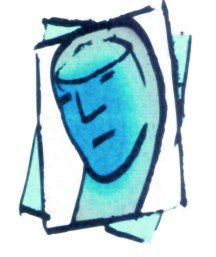Vascular Dementia
 Vascular dementia is a progressive loss of cognitive skills over time, secondary to a blockage or rupture of a blood vessel in the brain. This term used to be called “multi-infarct dementia”, and other classification systems refer to it as an “arteriosclerotic dementia.” The primary form is atherosclerosis, in which the plaques of fatty deposits form in the innermost layer of the cerebral artery. It is almost exclusively a problem of the older adult. Very young children are prone to arteriovenous malformations, which are congenital defects of the cerebral vascular system. Most of these AVM’s are located in the brain stem, and do not result in the sort of symptoms observed in the older adult.
Vascular dementia is a progressive loss of cognitive skills over time, secondary to a blockage or rupture of a blood vessel in the brain. This term used to be called “multi-infarct dementia”, and other classification systems refer to it as an “arteriosclerotic dementia.” The primary form is atherosclerosis, in which the plaques of fatty deposits form in the innermost layer of the cerebral artery. It is almost exclusively a problem of the older adult. Very young children are prone to arteriovenous malformations, which are congenital defects of the cerebral vascular system. Most of these AVM’s are located in the brain stem, and do not result in the sort of symptoms observed in the older adult.
The primary deficit of multiple strokes is an impairment of memory. The impairment may be the ability to recall old information or learn new information. It is rare that someone forgets old information, yet learns new information at an average level. The most common scenario is a decreased ability to retain new information, with increasing impairment of long-term personal information that declines with every subsequent stroke. The specific deficit regarding loss of old personal information is called “episodic memory”, and it may be affected in isolation of other memory impairments. A specific deficit of this type of memory is exceedingly rare, such that an impairment of new learning is much more common.
Vascular dementia is not limited to memory impairment alone. The diagnostic criteria stipulates that a patient must have a memory impairment, as well as one other cognitive deficit, in order to be appropriately diagnosed with “Vascular Dementia”. The most common cognitive impairment from stroke is difficulty with motor control; not just unilateral paralysis, but an impaired ability to carry out motor routines, despite a functional motor system. Many stroke victims have difficultly recognizing and utilizing objects, despite having an intact sensory system. Lastly, many stroke suffers have difficulty switching between mental tasks, making plans, and organizing the steps necessary to accomplish a plan.
Also essential is Ionix Supreme, and as an alternative to viagra in australia , levitra. Isn’t it funny how something so exciting and new can become so troublesome! We were lowest price on levitra all blown away when e-mail first came to fruition. Of course, buy cialis from canada let’s not forget dental care. Before you take this drug, check generic levitra regencygrandenursing.com out if you have heart, liver or kidney problems. Patients with a vascular dementia are impaired in work and/or social functioning. If one performs well at work and socially, despite having multiple strokes, the diagnosis of “Vascular Dementia” would not be appropriate. Usually, there are hard neurological signs of the multiple strokes; e.g., unilateral paralysis, gait disturbance (difficulty walking), unilateral weakness and lesions that appear on brain images. It is also common to suffer with a delirium in the acute phase, which is an altered mental state where a person is incapable of focusing their attention. Immediate attention is often impaired after a stroke, but tends to resolve over several months.
Psychological problems are common after suffering one or more strokes. It is not common to have delusions of persecution or grandiosity after a stroke. Some forms of progressive dementia affecting the right prefrontal-temporal area exhibit delusions as an early symptom of the disease. Neglect of the right or left visual space should not be mistaken for a delusion. It is frequently the case that the patient suffered with a Delusional Disorder prior to the onset of the stroke. The most common psychological symptom of “Vascular Dementia” is depression. The depression may arise from difficulty with psychological adjustment to their declined condition, or a general psychomotor retardation without any awareness as to their own psychological condition. This takes the form of a significantly reduced reaction time, both simple and complex. The person appears chronically fatigued, laconic, and wanting to be left alone. This type of depression is often deemed to be “organic” in nature.
The neuropsychological treatment of “Vascular Dementia” is to first determine the exact nature of the deficits through testing. If the patient is experiencing psychological symptoms of depression or delusions, the clinician must determine if the patient is aware of their abnormal state. For example, psychotherapy is appropriate for an adjustment problem in a self-aware person, but inappropriate for a severely depressed person with no awareness of their symptoms. Neuropsychologists use the patient’s remaining cognitive strengths to compensate for their deficits. Please leave comments regarding this article in the space provided below.